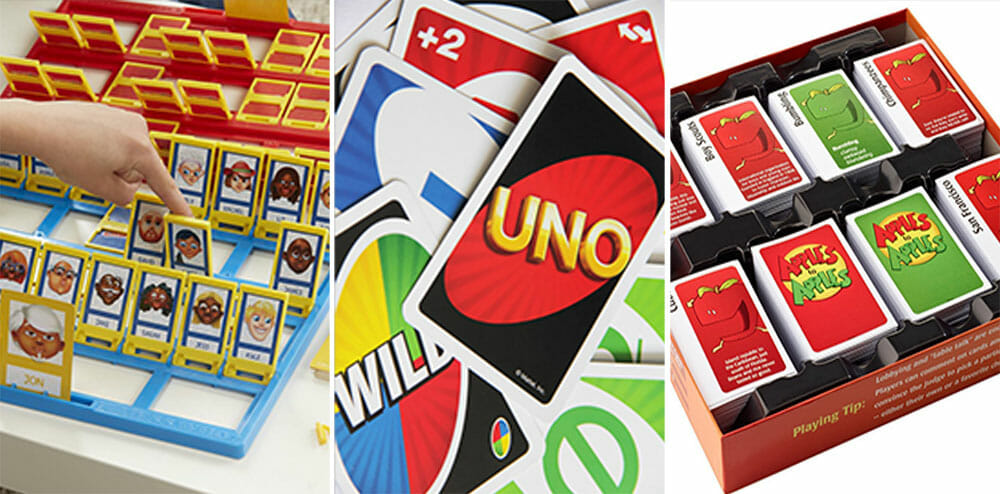At the end of each session, your child’s speech-language pathologist (SLP) recommends therapy homework for you to complete before your next session. You’re probably thinking, “Sure, let me get right on that after I prepare multiple meals for my entire family, bathe the children, get the children ready for bed, tackle household chores, prepare for the next day, have limited ‘me’ time, and then hit repeat for tomorrow.” We get it!
Life is busy! That’s why it’s so important to find functional – and fun! – ways to elicit speech and language in your home. Board games target speech, language, and social skills while also offering a fun time for family bonding. But therapy homework doesn’t always have to be “work” – it can be seamlessly incorporated into fun activities your family enjoys. Here’s a quick guide of how to combine a few of our favorite family games with therapy homework:
Guess Who
Guess Who is a classic game of questions. Each player chooses a character card for their opponent to guess. Each player takes turns asking questions regarding physical features of their opponent’s character card (example: “Is your person a boy or a girl?”). All questions must be answered as “yes” or “no.” The player who guesses their opponent’s character card first wins!
- Receptive language: Target your child’s ability to comprehend vocabulary and distinguish between obvious and subtle physical differences (example: “Does your character have short hair?”).
- Expressive language: Target your child’s ability to phrase a question appropriately and use descriptive language.
- Inferencing: Target your child’s ability to conclude which characters should be eliminated (example: If your opponent answers that their character is not a boy, who should you put down? All of the girls.)
- Speech sounds: Target your child’s ability to self-monitor articulation of speech sounds by producing carrier phrases during game play:
- “Is your character __?”
- “Does your character have __?”
- “Yes/no, my character is/has ___.”
UNO
Each player takes turns matching a card in their hand by either a color or number with the current card on the top of the deck. There are special action cards (Skips, Reverses, Draw Twos, Wild, and Draw Four Wild cards). If you can’t match a card, you draw from the center pile. You must shout “UNO!” when you only have on card remaining. The first person to discard all of their cards wins!
- Receptive language: Target your child’s ability to follow simple directions, identify colors, identify numbers, and matching skills.
- Speech sounds: Target your child’s ability to produce speech sounds by saying the color and number/name of each card they put down. You can have a list of target words/phrases/sentences and have your child say each target the number of times pictured on the card (example: blue 4 – say your target 4x).
- Pragmatics/Social skills: Target your child’s conversational skills by targeting turn-taking, topic maintenance, and not interrupting. Each number can represent the number of conversational turns each topic must last (example: red 3 – discuss your favorite foods for 3 conversational turns).
Apples to Apples
Apples to Apples is a game of combinations. Select a card from your hand (red cards are “things”) that you think best relates to a card selected by the judge (green cards are “descriptions”). If the judge selects your card combination, you win the round. Each player takes a turn being a judge. Collect a predetermined number of cards first and you win!
- Receptive language: Target your child’s ability to understand semantics (meaning of words) by appropriately playing a word related to the description card.
- Expressive language: Target your child’s ability to reason why they selected the winning card and why the other cards were not as appropriate.
- Speech Sounds: Target your child’s ability to self-monitor articulation of speech sounds by reading each card aloud and explaining a reason for their selected winner.
- Pragmatics/Social skills: Target your child’s ability to participate in turn-taking, not interrupting, reasoning, asking clarification, and accepting/rejecting a person’s opinion.
Practicing speech and language skills should be functional in order to best develop skills across many settings. Don’t hesitate to ask your child’s SLP about more functional ways that you can practice target skills at home!








